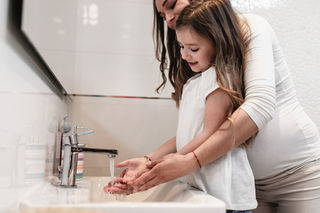Parenting
Parenting During COVID-19
A bulleted list to stick up on the fridge.
Posted March 12, 2020 Reviewed by Matt Huston
My almost-6-year-old marched down the stairs a couple of days ago holding his baby doll. "My baby has coronavirus," he told me. Then he spiked the (luckily rubber) doll like a football. "So I'm gonna do that to him!"
My 4-year-old is upset that his preschool class trips have been canceled (as of now, the school itself is still open, though that's likely to change soon, as all signs suggest it should). "And it's all because of the stupid virus," he moped as he got dressed this morning.
Coronavirus. COVID-19. Social distancing. A week ago these were obscure, unknown terms. Now our social media feeds are littered with them. We are being inundated with information. And then inundated again, because things change hour to hour. And as they do, we readjust our schedules, our daily routines, our expectations, our plans. The atmosphere is one of uncomfortable uncertainty at best, sheer terror at worst, and most of the time somewhere in between.
Articles about how to parent right now — how to talk to our kids and help calm their fears — abound. I've read many. Contributed to some. And now I'm writing my own. Why? Because what I haven't seen yet is a bulleted list, a set of short and sweet and pragmatic tips you could print out and hang on your fridge as a reference. And so that's going to be my contribution. For today. Here goes:

- Be the grown-ups. It's on us to start conversations with our kids. Continue to ask them what new things they've heard about the virus, to correct misinformation, and to answer their questions honestly and using short sentences. Kids get bogged down in words.
- Point out things that are different. Birthday parties are being canceled. Mommy is working from home. (Maybe) there's no school. People aren't traveling for spring break.
- Point out things that are the same. You're still having Honey Nut Cheerios for breakfast. You're still watching your favorite shows. We still have to brush our teeth.
- Play, play, play. Kids work things out with stuffed animals, dolls, action figures, costumes. Let your little ones be mad at the virus, attempt to control it. Maybe Elsa casts a spell so that it freezes in its tracks. Maybe Ryder and the pups go on a rescue mission to help those who are sick. Maybe you mix a COVID-19 cure potion involving food coloring, glitter, and whatever else.
- Put your phone away for set periods of time. Our kids sense, and feel uneasy, when we are distracted. Mumbling "Mmmmhmmm" as your child tells a story, while you simultaneously scroll and swipe, is not helpful. Being intentional and clear about your phone use is. "I am going to play with you right now, so I'm putting my phone on the shelf"; and "I am going to take a few minutes to check my phone right now, so I won't be able to play for a bit."
- Structure and routines are your friends. Even more than usual, and particularly as daily life looks less and less familiar. The world may feel chaotic and unpredictable, but your home doesn't have to. Consider making a daily schedule and hanging it up for all to see (use pictures if your kids can't read yet).
- Validate feelings of anger and disappointment. It stinks that you had to cancel your spring break travel plans. Or your sleepover party. Or your school play. It's OK to cry, hit the couch, even yell for a bit. Spending time at your local park as opposed to Disney World is not, in fact, a "super fun adventure." Your kids are little, not stupid.
- Simultaneously, model reframing and looking on the bright side. Maybe there's a lot more family time now that both parents are working from home. Or maybe your child can finally do that epic art project he's been thinking about. Or maybe he can take on a new job or chore, now that the whole family needs to pitch in, and you can emphasize what a "big kid" he's become.
- Emphasize agency. Your family is not just sitting around at home passively waiting for forces out of your control to take shape as they will. No! Frame what you are doing, what we all need to do, as a set of actions. Your family is doing its part by helping to stop the virus, exercising agency by washing hands so thoroughly, working together as superheroes spreading health and safety around the world.
- Answer questions with factual knowledge. Then stop. If your children have questions about the virus, answer them honestly. Then stop talking. If they have follow-up questions, they'll ask. And then you can answer again.
- If your child asks the same question again and again, point that out. "But are we going to get it?" "Wait, are we going to get it?" "Are Grandma and Grandpa going to get it?" If your child continues to ask the same question, or very similar ones, then he or she is likely reassurance-seeking, which is a sign of anxiety. It's okay to acknowledge that: "Sometimes when we are worried, we ask the same question over and over. The worry fools us into thinking that will help, but it actually doesn't."
- Then provide helpful, calming strategies. What does help when we're worried is getting into our bodies ("Let's do some jumping jacks!"), or doing some deep breathing ("Smell the cookies as they come out of the oven, now blow on them since they're too hot to eat"). You know what makes worry get even bigger? Worrying about the worry! ("And then worrying about the worrying about the worry!" your child may say, and suddenly you're in a playful interaction and things don't feel quite as bad anymore.)
- It's OK to say "I don't know," or "I have to think about it." Our little ones need us to project a calm, clear confidence. This is not synonymous with knowing all of the answers. Pause. Think. Look something up. Ask a parent friend how they might respond.
- Move your body. Jump. Dance. Stretch. Family dance party. The mind-body connection is real. When we feel grounded in our bodies, our emotional state often improves as well.
- Focus on community, both local and global. Talk out loud about how you are going to check in on your elderly neighbors to make sure they have all they need. Mention that right now everyone in the world is working together to solve this problem. Guess how many people on your street are washing their hands at the exact same time you are. Your family is not alone in handling these challenges; you are part of a greater whole.
- Let your little ones play "Baby." One common way that little kids ask for extra comfort and nurturing is by playing baby, either directly ("Let's pretend I'm your baby") or indirectly (e.g., speaking in baby talk). Don't shut this down right away; rather, play along. "Oh, my little sweet baby, yes, let me pick you up and give you snuggles." Don't you kind of wish you could play baby right about now, too?
- Expect regressions. When children have to adjust to a completely new routine, or are sensing anxiety around them, their developing brains can't always handle that shift on top of everything else; internal resources get allocated to the new task at hand, and something else goes. Your potty-trained toddler may start having accidents, or your self-assured kindergartner might start showing some clinginess. That's okay, and to be expected.
- Take care of yourself. The number one thing children need to stay calm during difficult times is a parent (or caregiver) who stays calm during difficult times. If you are feeling panicked or overwhelmed, do what you can to regulate yourself before attempting to calm your child. If your attempts to soothe your child are out of sync with your worried demeanor and energy, your child will notice, and this will be even more distressing for them. You're better off being honest than faking it: "I am feeling a bit worried myself right now, and so I am going to take a few deep breaths before answering your questions. Do you want to come sit next to me and we'll take them together?"
- Reach out for professional support if needed. As always, if you are worried about, or even just confused by, something your child is doing or saying, please don't hesitate to reach out to a child mental health professional for guidance. We are in uncharted territory, and you don't have to go it alone.
Facebook image: TijanaM/Shutterstock


